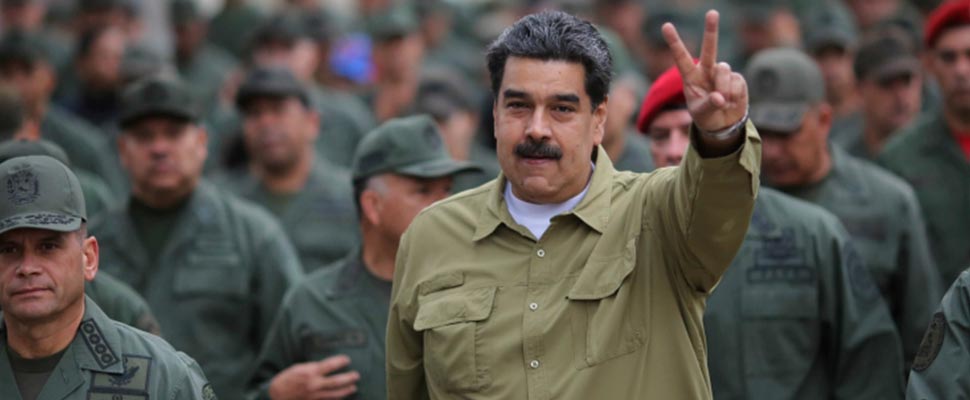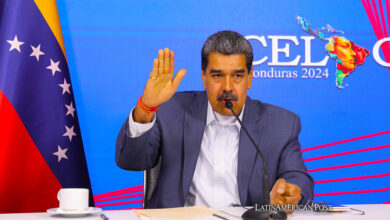Does Maduro have oil to buy vaccines?
Venezuela's oil sector, which at some point gave an orientation to the country for a long time, has been permanently paralyzed.

Fuel shortages have led the country to a point where there is no turning back. Photo: Reuters
LatinAmerican Post | Carlex Arujo
Listen to this article
Leer en español: ¿Maduro tiene petróleo para comprar vacunas?
The wells and refineries that processed most of the oil for exports have severely dropped their production, due to mismanagement and sanctions imposed by the United States. In this sense, this situation has caused the economy to be dismantled, which is why the fuel shortage has led the country to a point where there is no turning back, according to Sheyla Urdaneta of The New York Times.
The bonanzas of 2011, in the framework of Venezuela's oil
According to Petróleos de Venezuela, SA (PDVSA), approximately a decade ago in 2011, the average production of crude oil was 2 million 991 thousand barrels per day and its price oscillated around 101.8 dollars, which was based on in the operation of 19,743 wells and 232 active drills. That is why by then Venezuela managed to position itself as the country with the highest production in Latin America.
On the other hand, the Organization of the Petroleum Exporting Countries (OPEC) recognized Venezuela as the first country in proven and certified crude oil reserves, worldwide. there is even a report that expresses the statistics of the Central Intelligence of the United States (CIA World Factcbook), where this the nation with the largest oil stocks in the world.
La economía venezolana con Chávez vs. con Maduro ???????? El precio del petróleo ha tenido mucho que ver en el cambio de tendencia https://t.co/HFJW3zTXKv #Venezuela
— Statista en español (@Statista_ES) March 15, 2019
Oil production in Venezuela, in 2021
In March, the Organization of the Petroleum Exporting Countries (OPEC) released a report which highlights that Venezuela produced 521,000 b / d of oil per day during the month of February, representing an increase of 7%, versus the month previous. In addition, the report indicates that it does not have active drilling rigs and that this stoppage began in early 2020. To better understand the outlook, in 2019, according to OPEC, Venezuela produced 742,000 barrels per day, of which it shipped 320,000 b / d to China and 218,000 b / d to India, in 2019 and to other markets such as Europe that received 119,000 b / d, Cuba 70,000 b / d, Singapore 55,000 b / d and Malaysia 53,000 b / d, this was cited in information published by the Center for Studies Inter-American Dialogue.
Venezuela will be offering oil bonds
China
In 2019, the Venezuelan government asked Beijing for a large sum of $ 5 billion to invest in its oil infrastructure. However, this economic link has been reinforced since 2008, after which Venezuela will increase its crude exports, although some experts consider that this amount fluctuates between 50,000 and 70,000 million dollars.
Russia
In 2017, Venezuela was forced to reform its debt with Russia for an amount of 3,150 million dollars, including some sources close to PDVSA, expressed that they have to send a quota of 600,000 b / d, but only comply with 300,000 b / d.
Turkey
In 2018, Nicolás Maduro encouraged Turkey to invest in the exploitation of a mining reserve called “Arco del Orinoco”, which has deposits of gold, diamond, and coltan. According to the Venezuelan president, the commercial relationship between the nations is only 800 million dollars, however, Luis Vicente León, economist, and director of the firm DATANÁLISIS, assures that the external debt is 125,000 million dollars, according to the Portal Web The Republic.
Along these lines, Venezuela will continue to offer large quotas of Venezuelan oil reserves for vaccines, because it does not have the liquidity to pay for them. That is why only a few doses have arrived.
Also read: The consequences of the Covid-19 denialist governments
Acquisition of vaccines against the coronavirus, so far
In Venezuela, only the Russian Sputnik V vaccine is being provided, for the immunization of Venezuelans, however, of 10 million vaccines, only 50,000 doses have arrived, of which the distribution criterion was not sanitary, but political. Therefore, opposition leader Juan Guaidó stated that it is essential that the nation receive inoculations through the COVAX system, with the support of the Pan American Health Organization (PAHO) and the United Nations International Children's Emergency Fund (UNICEF).
#EnFotos ???? | Canciller @jaarreaza en compañía del ministro para la Salud, @AlvaradoC_Salud y el embajador de la Federación Rusa, @EmbSergio recibe vuelo de @LAConviasa con 50 mil vacunas #SputnikV para la immunización de los venezolanos contra el #Covid_19#CuídateDeLaCovid19 pic.twitter.com/kwVN4LVtUp
— Cancillería Venezuela ???????? (@CancilleriaVE) March 29, 2021
On the other hand, Venezuela will apply the Cuban vaccine Abdala to the Venezuelans, despite the fact that it has not been scientifically certified. Paradoxically, Maduro rejected the distribution of 2.4 million vaccines from AstraZeneca, on the pretext that the medicine is causing accidents in the world.
Vacunación contra el covid-19 va "a paso de tortuga" en Venezuela #26Mar . Por @jadesdelgado (+reportaje)???????? ???? https://t.co/xE1St0nO29
— CaraotaDigital (@CaraotaDigital) March 26, 2021
Oil for vaccines
In this context, with the low production that Venezuela has brought since 2013, there is no possibility that vaccines will be exchanged for oil. Or at least, not for immediate payment, due to the low production of Venezuelan oil at the moment and that a large part of it has already been agreed to other destinations. Most likely, Maduro will try to continue selling his oil bonds, in exchange for continuing to mortgage future oil production in Venezuela.




